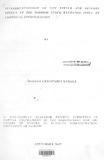Interrelationship of size effect and January effect at the Nairobi stock exchange (NSE): an empirical investigation
| dc.contributor.author | Lukale, Osango Christabel | |
| dc.date.accessioned | 2013-02-28T16:08:18Z | |
| dc.date.issued | 2007-09 | |
| dc.identifier.citation | MBA | en |
| dc.identifier.uri | http://erepository.uonbi.ac.ke:8080/xmlui/handle/123456789/12621 | |
| dc.description.abstract | Seasonality in stock returns has been of great importance to financial scholars and practitioners. The size effects indicate that the stocks returns are a decreasing function of firm size whereas the January effect is situation where stock returns in January are higher than the average return in any other month. The objective of the study was to establish whether there is any interrelationship between size and January effect at the NSE. To facilitate the attainment of the objective of this study, data was collected from the NSE in form of monthly stock prices for the period 1 January 1999 to 31December 2006.The Chi-squared and Mann-Whitney U testes were used to find out whether there was any significant difference between the two effects. From the study it was found that there was no significant relationship between the size effect and January effect at the NSE. This is inconsistent with the findings from other stock markets. This could mean that the NSE is an efficient market at least in the weak form. The implication of the findings is that no investor is better off or worse off on average by choosing to invest in either small or large sized companies in January or in any other month of the year. | en |
| dc.language.iso | en | en |
| dc.subject | Nairobi stock exchange | en |
| dc.subject | Empirical | en |
| dc.subject | Investigation | en |
| dc.subject | January effects | en |
| dc.title | Interrelationship of size effect and January effect at the Nairobi stock exchange (NSE): an empirical investigation | en |
| dc.type | Thesis | en |
| local.publisher | School of Business | en |

